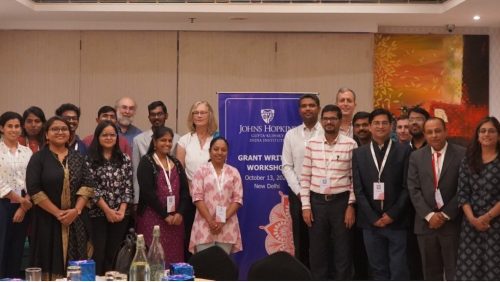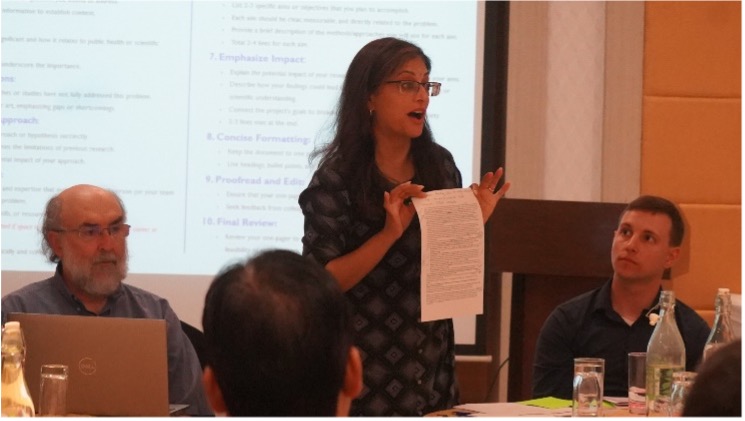
GKII Workshop Prepares Scientists for Grant Writing Success
By Ira Pundeer
Effective grant writing is crucial to secure funding for high-impact research projects. Yet, these essential skills are often overlooked in formal education, leaving many researchers struggling to advance their work.
To overcome this critical knowledge gap, on October 13, 2023, the Gupta-Klinsky India Institute at Johns Hopkins University organized the “Grant Writing Workshop: Building Effective Specific Aims Pages” with the goal of equipping researchers to articulate their vision, demonstrate potential impact, and secure the financial support essential for driving innovation and transformation.
The workshop brought together 15 senior scientists and researchers from some of India’s top research institutes and organizations, including the Indian Council of Medical Research (ICMR) and All India Institute of Medical Sciences (AIIMS). Facilitated by faculty members from the Johns Hopkins Whiting School of Engineering, the workshop zeroed in on the Specific Aims page, a pivotal component that can either make or break grant proposals.
 To stimulate participants’ creativity and foster collaboration, the workshop integrated improvisational exercises into the learning experience. Before the workshop, participants were encouraged to share draft Aims pages summarizing their research proposals. Once underway, they actively engaged in providing real-time feedback on each other’s Specific Aims pages, mirroring the review process. This allowed them to collaboratively brainstorm on the significance of their research, identify compelling elements, and avoid jargon that might perplex non-experts. The workshop added value to the grant writing process by making it more realistic, quality-focused, and engaging.
To stimulate participants’ creativity and foster collaboration, the workshop integrated improvisational exercises into the learning experience. Before the workshop, participants were encouraged to share draft Aims pages summarizing their research proposals. Once underway, they actively engaged in providing real-time feedback on each other’s Specific Aims pages, mirroring the review process. This allowed them to collaboratively brainstorm on the significance of their research, identify compelling elements, and avoid jargon that might perplex non-experts. The workshop added value to the grant writing process by making it more realistic, quality-focused, and engaging.
Dr. Shahanara Valawalkar, one of the participants, shared that this was her first attempt at writing a Specific Aims page and, quite frankly, she didn’t know what to expect. To her surprise, her Aims page, focused on a potential research study in the field of child health, was selected as the first to be reviewed by the group. Describing the feedback she received, Shahanara said, “It was the most honest, clear, succinct, and well-directed feedback I have ever received. I came back with so much clarity in my thought process. I have gone from being clueless about a Specific Aims page to theoretically knowing what a good one looks like.”
Dr. Sri Sarma, Vice Dean for Graduate Education at Whiting School of Engineering, and a key facilitator, emphasized that effective grant writing requires clarity, conciseness, and a persuasive approach that can attract potential funders. “It’s all about communicating one’s vision with precision and demonstrating the significance and feasibility of the project,” she said. Dr. Sarma was joined by co-facilitators and prominent figures from Johns Hopkins’ entrepreneurial ecosystem, Dr. Chuck Montague, Director of Business Development, and Dr. Patrick Myers, Director of Product Development, both from the Department of Biomedical Engineering.
| “Effective grant writing goes beyond securing funding; it fosters collaboration, enhances planning, promotes innovation, and amplifies voices advocating for crucial research and development work. These initiatives align with the Institute’s mission to lower research barriers in India through collaborations with local partners and sharing expertise.”
– Dr. Sara Bennett, GKII Faculty Steering Committee Co-Chair |
 Dr. Pradip Kharya, an Assistant Professor in Community Medicine and Family Medicine at All India Institute of Medical Sciences (AIIMS), Gorakhpur, shared a Specific Aims page on a community-based study to prevent anemia in Uttar Pradesh. He found the review process during the workshop useful for enhancing his ability to condense complex research ideas into a single, focused “Specific Aims” page. “One experience that made the workshop particularly memorable for me was discussing critical thinking skills both individually and collectively,” said Dr. Kharya.
Dr. Pradip Kharya, an Assistant Professor in Community Medicine and Family Medicine at All India Institute of Medical Sciences (AIIMS), Gorakhpur, shared a Specific Aims page on a community-based study to prevent anemia in Uttar Pradesh. He found the review process during the workshop useful for enhancing his ability to condense complex research ideas into a single, focused “Specific Aims” page. “One experience that made the workshop particularly memorable for me was discussing critical thinking skills both individually and collectively,” said Dr. Kharya.
The diversity of research subjects pursued by the participants provided an invaluable networking opportunity to meet and learn from individuals working in various fields, including clinical research, public health, and project implementation. Dr. C Sreedhar, Treatment Lead at Program ACCELERATE, an HIV project in India implemented by Johns Hopkins University School of Medicine, submitted a Specific Aims page focusing on the integration of treatment for non-communicable diseases in Anti-Retroviral Therapy (ART) centers for people living with HIV in India. He reflected on the workshop’s vibrant and interactive environment, saying, “It was a wonderful experience meeting people from various fields, actively discussing and learning from each other. Unlike a typical classroom experience, the mentors ensured participants remained actively engaged, making the learning process enjoyable. I was surprised to find many errors in my own Aims page, and it made me realize how much I gained from the workshop.”
Rechel Shrisunder, a behavioral scientist from Center for Infectious Diseases in India at Johns Hopkins School of Medicine, observed that the workshop masterfully blended information and interaction. “Guided by mentors and peers, I honed my ability to write concisely and compellingly, discovering the power of clear, credible language. Kudos to the organizers for this valuable experience. Eagerly anticipating more workshops like this.”